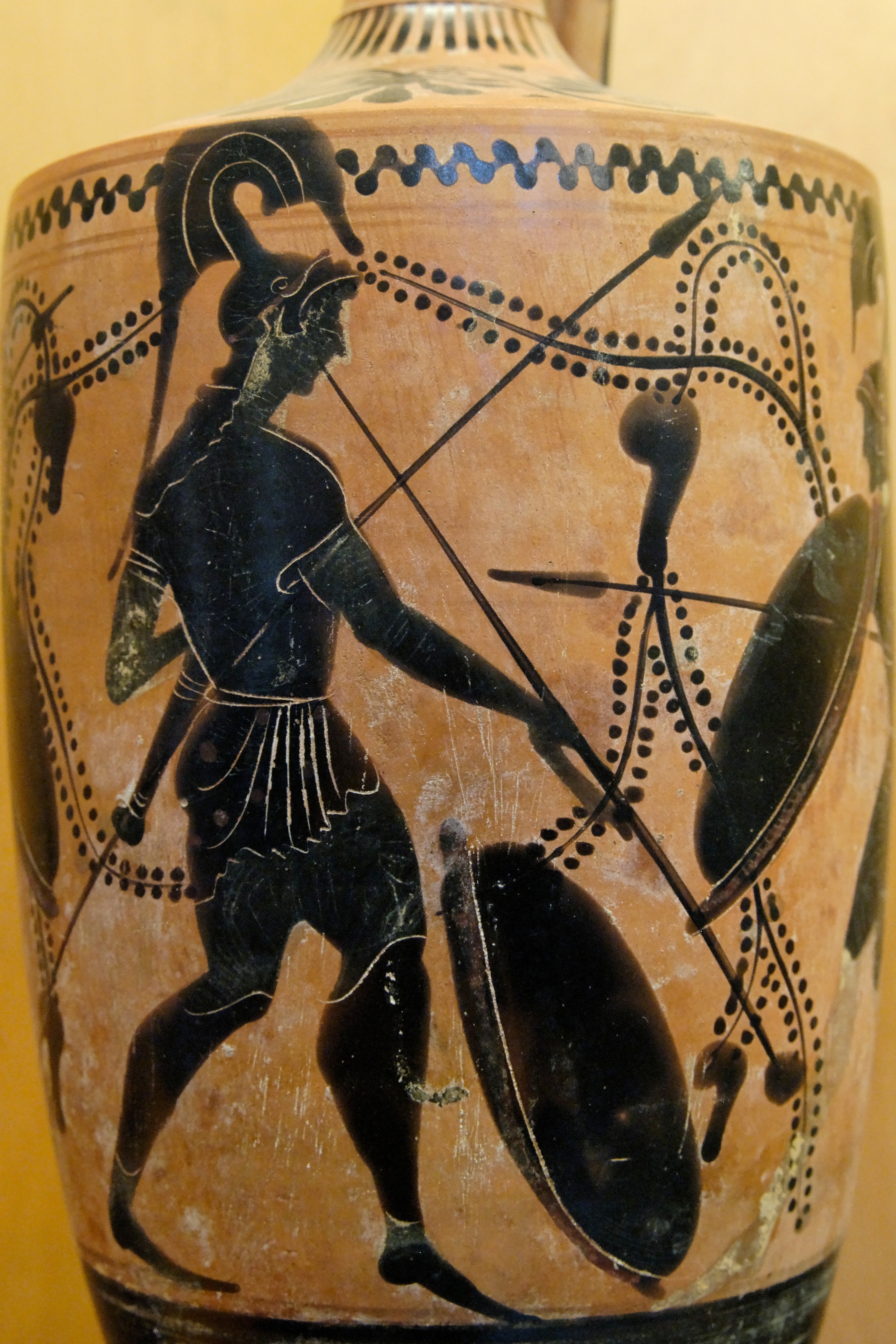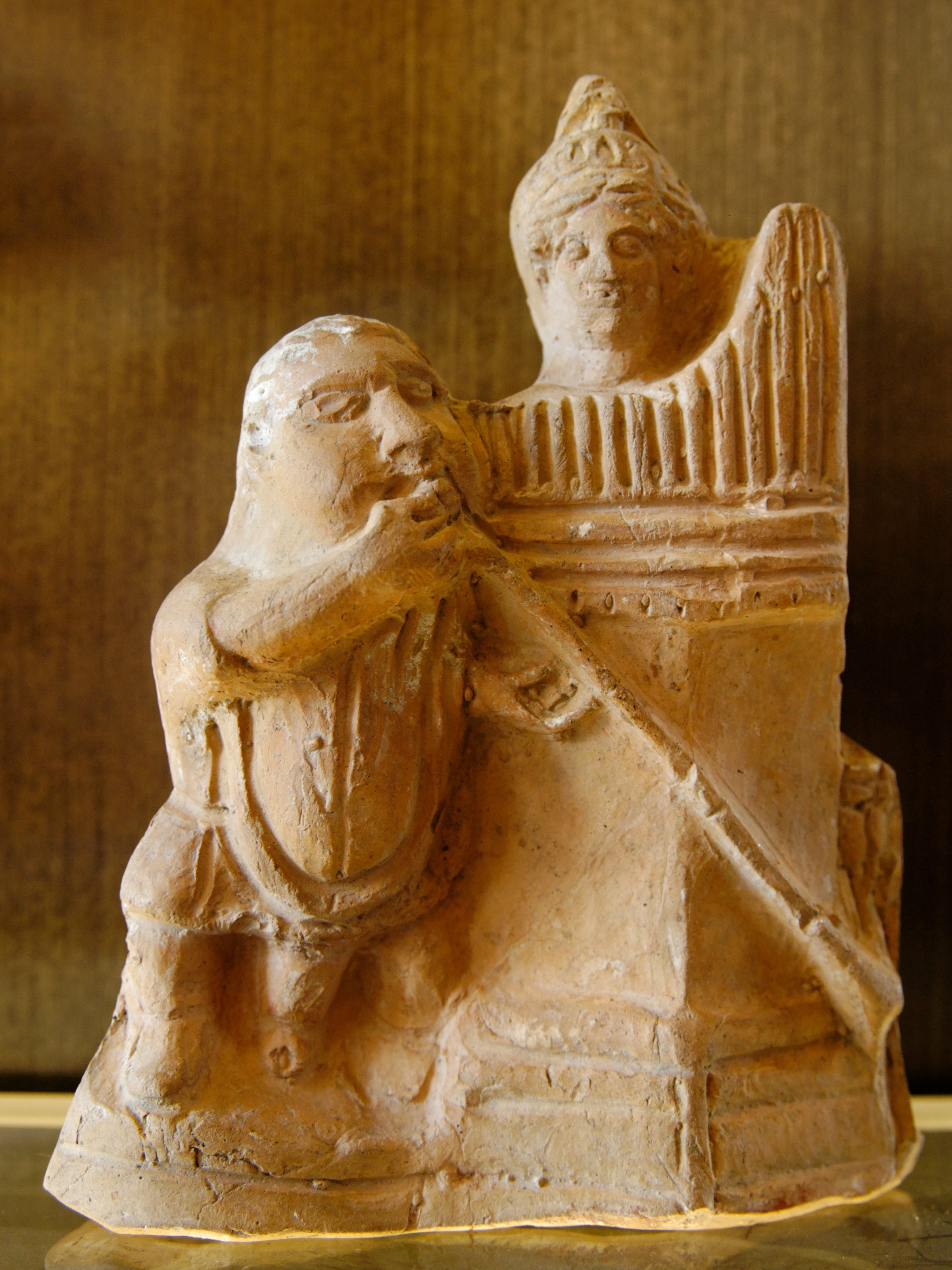|
Music Of Ancient Greece
Music was almost universally present in ancient Greece, ancient Greek society, from marriages, funerals, and Religion in ancient Greece, religious ceremonies to Theatre of ancient Greece, theatre, folk music, and the ballad-like reciting of epic poetry. This played an integral role in the lives of ancient Greeks. There are some fragments of actual Greek musical notation, many literary references, Ancient Greek vase painting, depictions on Pottery of ancient Greece, ceramics and relevant archaeology, archaeological remains, such that some things can be known—or reasonably surmised—about what the music sounded like, the general role of music in society, the economics of music, the importance of a professional caste of musicians, etc. The word ''music'' comes from the Muses, the daughters of Zeus and patron goddesses of creative and intellectual endeavours. Concerning the origin of music and musical instruments: the history of music in ancient Greece is so closely interwoven wi ... [...More Info...] [...Related Items...] OR: [Wikipedia] [Google] [Baidu] |
Salpinx Player MAR Palermo NI1853
A salpinx (; plural salpinges ; Greek σάλπιγξ) was a trumpet-like instrument of the ancient Greeks. Construction The salpinx consisted of a straight, narrow bronze tube with a mouthpiece of bone and a bell (also constructed of bronze) of variable shape and size; extant descriptions describe conical, bulb-like, and spherical structures. Each type of bell may have had a unique effect on the sound made by the instrument. The instrument has been depicted in some classical era vases as employing the use of a phorbeia, similar to those used by aulos players of the era. Though similar to the Roman tuba, the salpinx was shorter than the approximately 1.5 meter long Roman tuba. A rare example of a salpinx, held at the Museum of Fine Arts, Boston, is unique in that it is constructed from thirteen sections of bone connected using tenons and sockets (with bronze ferrules) rather than the long, bronze tube described elsewhere. This salpinx is over 1.57 m long dwarfing the common s ... [...More Info...] [...Related Items...] OR: [Wikipedia] [Google] [Baidu] |
Aristides Quintilianus
Aristides Quintilianus (Greek: Ἀριστείδης Κοϊντιλιανός) was the Greek author of an ancient musical treatise, ''Perì Musikês'' (Περὶ Μουσικῆς, i.e. ''On Music''; Latin: ''De Musica'') According to Theodore Karp, his three-volume work on music "constitutes one of the principal sources of modern knowledge of ancient Greek music and its relationship to other disciplines". According to the 17th-century scholar Marcus Meibomius, in whose collection (''Antiq. Musicae Auc. Septem'', 52) this work was printed for the first time in 1652, it contains everything on music that is to be found in antiquity. The dates of Aristides are uncertain. In his book he refers to Cicero (d. 43 BC), and his work was used by Martianus Capella (fl. 410-420). According to Thomas J. Mathiesen, Aristides flourished in the late 3rd or early 4th century AD. One piece of evidence for Aristides' date, according to Winnington-Ingram, is that fact in the work he addresses two fr ... [...More Info...] [...Related Items...] OR: [Wikipedia] [Google] [Baidu] |
Hymn
A hymn is a type of song, and partially synonymous with devotional song, specifically written for the purpose of adoration or prayer, and typically addressed to a deity or deities, or to a prominent figure or personification. The word ''hymn'' derives from Greek language, Greek (''hymnos''), which means "a song of praise". A writer of hymns is known as a hymnist. The singing or composition of hymns is called hymnody. Collections of hymns are known as hymnals or hymn books. Hymns may or may not include instrumental accompaniment. Polyhymnia is the Greco/Roman goddess of hymns. Although most familiar to speakers of English in the context of Christianity, hymns are also a fixture of other major religious groups, world religions, especially on the Indian subcontinent (''stotras''). Hymns also survive from antiquity, especially from Egyptian and Greek cultures. Some of the oldest surviving examples of notated music are hymns with Greek texts. Origins Ancient Eastern hymns include th ... [...More Info...] [...Related Items...] OR: [Wikipedia] [Google] [Baidu] |
Dionysus
In ancient Greek religion and Greek mythology, myth, Dionysus (; ) is the god of wine-making, orchards and fruit, vegetation, fertility, festivity, insanity, ritual madness, religious ecstasy, and theatre. He was also known as Bacchus ( or ; ) by the Greeks (a name later adopted by the Ancient Rome, Romans) for a frenzy he is said to induce called ''baccheia''. His wine, music, and ecstatic dance were considered to free his followers from self-conscious fear and care, and subvert the oppressive restraints of the powerful. His ''thyrsus'', a fennel-stem sceptre, sometimes wound with ivy and dripping with honey, is both a beneficent wand and a weapon used to destroy those who oppose his Cult of Dionysus, cult and the freedoms he represents. Those who partake of his mysteries are believed to become possessed and empowered by the god himself. His origins are uncertain, and his cults took many forms; some are described by ancient sources as Thrace, Thracian, others as Greek. In O ... [...More Info...] [...Related Items...] OR: [Wikipedia] [Google] [Baidu] |
Apollo
Apollo is one of the Twelve Olympians, Olympian deities in Ancient Greek religion, ancient Greek and Ancient Roman religion, Roman religion and Greek mythology, Greek and Roman mythology. Apollo has been recognized as a god of archery, music and dance, truth and prophecy, healing and diseases, the Sun and light, poetry, and more. One of the most important and complex of the Greek gods, he is the son of Zeus and Leto, and the twin brother of Artemis, goddess of the hunt. He is considered to be the most beautiful god and is represented as the ideal of the ''kouros'' (ephebe, or a beardless, athletic youth). Apollo is known in Greek-influenced Etruscan mythology as ''Apulu''. As the patron deity of Delphi (''Apollo Pythios''), Apollo is an oracular god—the prophetic deity of the Pythia, Delphic Oracle and also the deity of ritual purification. His oracles were often consulted for guidance in various matters. He was in general seen as the god who affords help and wards off e ... [...More Info...] [...Related Items...] OR: [Wikipedia] [Google] [Baidu] |
Aulos
An ''aulos'' (plural ''auloi''; , plural ) or ''tibia'' (Latin) was a wind instrument in ancient Greece, often depicted in art and also attested by archaeology. Though the word ''aulos'' is often translated as "flute" or as " double flute", the instrument was usually double-reeded, and its sound—described as "penetrating, insisting and exciting"—was more akin to that of modern woodwind instruments such as oboes or bagpipes with a chanter and (modulated) drone. An aulete (, ) was the musician who performed on an ''aulos''. The ancient Roman equivalent was the ''tibicen'' (plural ''tibicines''), from the Latin ''tibia,'' "pipe, ''aulos''." The neologism aulode is sometimes used by analogy with '' rhapsode'' and ''citharode'' ( citharede) to refer to an ''aulos''-player, who may also be called an aulist; however, ''aulode'' more commonly refers to a singer who sang the accompaniment to a piece played on the aulos. Background There were several kinds of ''aulos'', sin ... [...More Info...] [...Related Items...] OR: [Wikipedia] [Google] [Baidu] |
Twelve Olympians
file:Greek - Procession of Twelve Gods and Goddesses - Walters 2340.jpg, upright=1.8, Fragment of a Hellenistic relief sculpture, relief (1st century BC1st century AD) depicting the twelve Olympians carrying their attributes in procession; from left to right: Hestia (scepter), Hermes (winged cap and staff), Aphrodite (veiled), Ares (helmet and spear), Demeter (scepter and wheat sheaf), Hephaestus (staff), Hera (scepter), Poseidon (trident), Athena (owl and helmet), Zeus (thunderbolt and staff), Artemis (bow and quiver) and Apollo (lyre) from the Walters Art Museum. In ancient Greek religion and Greek mythology, mythology, the twelve Olympians are the major Deity, deities of the Greek Pantheon (religion), pantheon, commonly considered to be Zeus, Poseidon, Hera, Demeter, Aphrodite, Athena, Artemis, Apollo, Ares, Hephaestus, Hermes, and either Hestia or Dionysus. They were called ''Olympians'' because, according to tradition, they resided on Mount Olympus. Besides the twelve Olym ... [...More Info...] [...Related Items...] OR: [Wikipedia] [Google] [Baidu] |
Libation
A libation is a ritual pouring of a liquid as an Sacrifice, offering to a deity or spirit, or in Veneration of the dead, memory of the dead. It was common in many religions of Ancient history, antiquity and continues to be offered in cultures today. Various substances have been used for libations, most commonly wine or other alcoholic drinks, olive oil, honey, and in India, ghee. The vessels used in the ritual, including the patera, often had a significant form which differentiated them from secular vessels. The libation could be poured onto something of religious significance, such as an altar, or into the earth. On the other hand, one or more libations began most meals and occasions when wine was drunk in Greco-Roman and other ancient societies, mostly using normal cups or jugs. Etymology The English word "libation" derives from the Latin ', an act of pouring, from the verb ', "to taste, sip; pour out, make a libation" (Indo-European root , "pour, make a libation"). Religio ... [...More Info...] [...Related Items...] OR: [Wikipedia] [Google] [Baidu] |
Alfred Szendrei
Alfred Szendrei, also Alfred Sendrey and Aladár Szendrei (29 February 1884 – 3 March 1976) was an American musicologist, organist, conductor, composer of Hungarian origin. He was one of the leading conductors and pioneers of German radio. In exile he changed his Hungarian surname "Szendrei" to the Americanized spelling "Sendrey". Life and career Szendrei was born in 1884 to a Hungarian middle-class family in Budapest (Austria-Hungary); his father was a civil servant. From the age of six he learned to play the piano.. At the request of his parents, he first studied jurisprudence at the Corvinus University of Budapest. From 1900 to 1905 he studied music with Hans Koessler at the university and Franz Liszt Academy of Music in Budapest. Afterwards he worked as Kapellmeister and répétiteur at the Cologne Opera (1905–07), in Mulhouse (1907–09), Brünn (1908–11), Philadelphia and Chicago (1911–12), at the Hamburg State Opera (1912–13), New York City (1913–14), Berli ... [...More Info...] [...Related Items...] OR: [Wikipedia] [Google] [Baidu] |
Skolion
A skolion (from ) (pl. skolia), also scolion (pl. scolia), was a song sung by invited guests at banquets in ancient Greece. Often extolling the virtues of the gods or heroic men, skolia were improvised to suit the occasion and accompanied by a lyre, which was handed about from singer to singer as the time for each scolion came around. "Capping" verses were exchanged, "by varying, punning, riddling, or cleverly modifying" the previous contribution. Etymology Although Greek folk etymology connects skolion with δύσκολος 'difficult', the likeliest connection is with σκέλος 'bent limb, part' as joined verse or repartee. This use is comparable to Japanese renga 'linked verse'. Background Skolia are often referred to as 'banquet songs', 'convivial songs", or 'drinking songs'. The term also refers to poetry composed in the same form. In later use, the form was used in a more stately manner for chorus poetry in praise of the gods or heroes. Terpander is said to have be ... [...More Info...] [...Related Items...] OR: [Wikipedia] [Google] [Baidu] |
Symposium
In Ancient Greece, the symposium (, ''sympósion'', from συμπίνειν, ''sympínein'', 'to drink together') was the part of a banquet that took place after the meal, when drinking for pleasure was accompanied by music, dancing, recitals, or conversation.Peter Garnsey, ''Food and Society in Classical Antiquity'' (Cambridge University Press, 1999), p. 13online Sara Elise Phang, ''Roman Military Service: Ideologies of Discipline in the Late Republic and Early Principate'' (Cambridge University Press, 2008), pp. 263–264. Literary works that describe or take place at a symposium include two Socratic dialogues, Plato's '' Symposium'' and Xenophon's '' Symposium'', as well as a number of Greek poems, such as the elegies of Theognis of Megara. Symposia are depicted in Greek and Etruscan art that shows similar scenes. In modern usage, it has come to mean an academic conference or meeting, such as a scientific conference. The Latin equivalent of a Greek symposium in Roman s ... [...More Info...] [...Related Items...] OR: [Wikipedia] [Google] [Baidu] |
Gymnastics
Gymnastics is a group of sport that includes physical exercises requiring Balance (ability), balance, Strength training, strength, Flexibility (anatomy), flexibility, agility, Motor coordination, coordination, artistry and endurance. The movements involved in gymnastics contribute to the development of the arms, legs, shoulders, back, chest, and Abdomen, abdominal muscle groups. Gymnastics evolved from exercises used by the Ancient Greece, ancient Greeks that included skills for mounting and dismounting a horse. The most common form of competitive gymnastics is artistic gymnastics (AG); for women, the events include floor (gymnastics), floor, vault (gymnastics), vault, uneven bars, and balance beam; for men, besides floor and vault, it includes still rings, rings, pommel horse, parallel bars, and horizontal bar. The governing body for competition in gymnastics throughout the world is the Fédération Internationale de Gymnastique (FIG). Eight sports are governed by the FIG, in ... [...More Info...] [...Related Items...] OR: [Wikipedia] [Google] [Baidu] |










